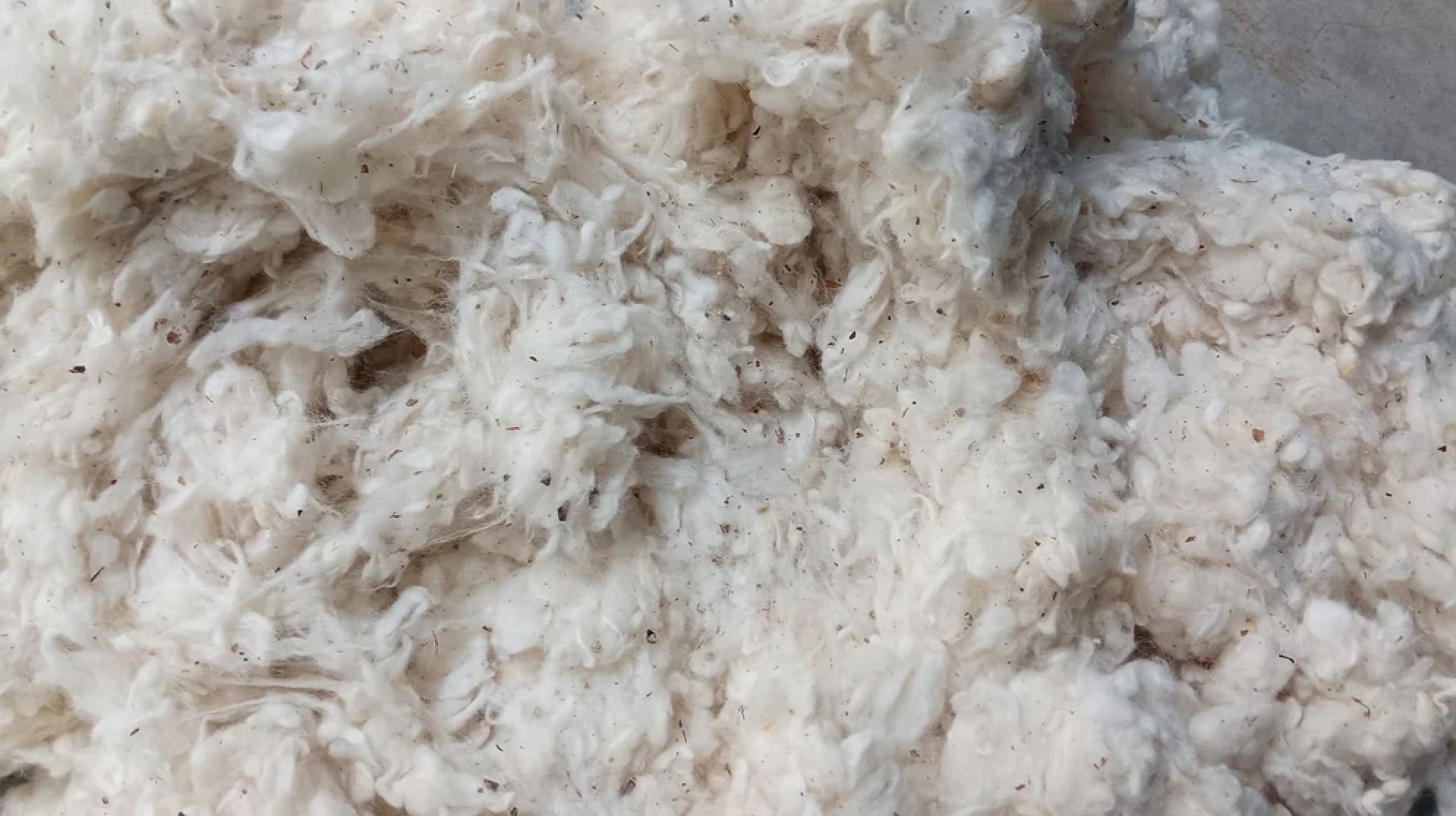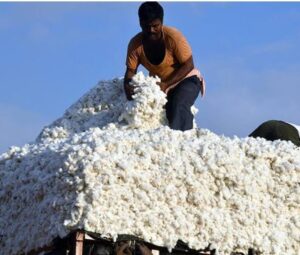
Cotton Waste
Cotton Waste
Cotton Waste

Soft Waste / Pneumafil
Pneumafil Cotton Waste is a soft, natural white fiber derived from the yarn production process. It consists of pure, trash-free bundles formed during the spinning of fine quality cotton. After carding and combing, the fibers align into smooth, parallel strands, ideal for spinning by hand or machine.
Applications:
- Used as raw material for open-end spinning mills.
- Used in regenerated cotton fabric production.
Features:
- High-quality fibers
- Lightweight and easy to process
- Recyclable for various textile applications

Roving Ends
Roving ends are high-quality cotton fiber residues left over from spinning mills. These fibers retain their strength and quality, making them ideal for various applications.
Applications:
- Used in open-end and ring spinning mills for yarn manufacturing.
- Recycled for nonwoven fabric production.
Features:
- High fiber length and strength.
- Clean with minimal contamination.
- Suitable for reuse in textile industries.

Soft Waste / Pneumafil
Pneumafil Cotton Waste is a soft, natural white fiber derived from the yarn production process. It consists of pure, trash-free bundles formed during the spinning of fine quality cotton. After carding and combing, the fibers align into smooth, parallel strands, ideal for spinning by hand or machine.
Applications:
- Used as raw material for open-end spinning mills.
- Used in regenerated cotton fabric production.
Features:
- High-quality fibers
- Lightweight and easy to process
- Recyclable for various textile applications

Roving Ends
Roving ends are high-quality cotton fiber residues left over from spinning mills. These fibers retain their strength and quality, making them ideal for various applications.
Applications:
- Used in open-end and ring spinning mills for yarn manufacturing.
- Recycled for nonwoven fabric production.
Features:
- High fiber length and strength.
- Clean with minimal contamination.
- Suitable for reuse in textile industries.

Comber Noil
Comber Noil is a high-quality byproduct of the ring-spun yarn spinning process. It is obtained when cotton is combed in the comber machine, removing short fibers and leaving trash-free cotton waste.
Applications:
- Used in the production of currency paper.
- Essential for manufacturing high-quality surgical cotton.
- Blended in open-end spinning yarn mills for fine yarn production.
Features:
- High-quality, short-staple fiber.
- Trash-free and clean cotton waste.
- Soft and highly absorbent.

Flat Strips (Upper Card Waste)
Flat Strips, also known as Upper Card Waste, are removed during the carding process. These fibers are relatively longer and cleaner than other carding waste.
Applications:
- Used in yarn manufacturing for recycled textiles.
- Suitable for nonwoven fabric and padding materials.
- Used in the production of coarse-count yarn.
Features:
- Medium fiber length and strength.
- Contains minimal contamination.
- Recyclable for textile and industrial use.

Comber Noil
Comber Noil is a high-quality byproduct of the ring-spun yarn spinning process. It is obtained when cotton is combed in the comber machine, removing short fibers and leaving trash-free cotton waste.
Applications:
- Used in the production of currency paper.
- Essential for manufacturing high-quality surgical cotton.
- Blended in open-end spinning yarn mills for fine yarn production.
Features:
- High-quality, short-staple fiber.
- Trash-free and clean cotton waste.
- Soft and highly absorbent.

Flat Strips (Upper Card Waste)
Flat Strips, also known as Upper Card Waste, are removed during the carding process. These fibers are relatively longer and cleaner than other carding waste.
Applications:
- Used in yarn manufacturing for recycled textiles.
- Suitable for nonwoven fabric and padding materials.
- Used in the production of coarse-count yarn.
Features:
- Medium fiber length and strength.
- Contains minimal contamination.
- Recyclable for textile and industrial use.

Hard Waste
Hard Waste is collected from spinning and winding processes where yarn or fiber is removed due to quality control. It consists of compact, strong fiber residues that can be reused in various textile applications.
Applications:
- Reused in coarse yarn manufacturing.
- Ideal for nonwoven fabric production.
Features:
- High strength
- Firm texture for durable applications
- Reusable and eco-friendly

Card Dropping
Card Dropping is the waste extracted during the carding process, where short fibers and impurities are removed from raw cotton. It is widely used in cost-effective manufacturing industries.
Applications:
- Used as raw material for open-end spinning mills.
- Recycled for low-cost textile production
Features:
- Contains short fiber content
- Good absorbency and lightweight
- Cost-effective raw material

Hard Waste
Hard Waste is collected from spinning and winding processes where yarn or fiber is removed due to quality control. It consists of compact, strong fiber residues that can be reused in various textile applications.
Applications:
- Reused in coarse yarn manufacturing.
- Ideal for nonwoven fabric production.
Features:
- High strength
- Firm texture for durable applications
- Reusable and eco-friendly

Card Dropping
Card Dropping is the waste extracted during the carding process, where short fibers and impurities are removed from raw cotton. It is widely used in cost-effective manufacturing industries.
Applications:
- Used as raw material for open-end spinning mills.
- Recycled for low-cost textile production
Features:
- Contains short fiber content
- Good absorbency and lightweight
- Cost-effective raw material

Sweeping
Sweeping cotton waste is eco-friendly, lightweight, and water-absorbent, making it ideal for industrial uses like mops, wiping cloths, mats, and cloth dolls. It is available at competitive prices.
Applications:
- Manufacturing wiping cloths and mats
- Used as stuffing for pillows and cushions & Toy’s.
Features:
- High quality and water-absorbent
- Eco-friendly and lightweight
- Soft texture and cost-effective

Blowroom Waste
Blowroom Waste is generated in the initial stages of cotton processing, where raw cotton undergoes cleaning and opening. It consists of larger fiber clusters and contaminants.
Applications:
- Used in coarse fabric and recycled yarn manufacturing
- Utilized in paper and packaging industries
- Reprocessed for insulation and padding materials
Features:
- Contains a mix of long and short fibers
- Requires further processing due to high impurity content

Sweeping
Sweeping cotton waste is eco-friendly, lightweight, and water-absorbent, making it ideal for industrial uses like mops, wiping cloths, mats, and cloth dolls. It is available at competitive prices.
Applications:
- Manufacturing wiping cloths and mats
- Used as stuffing for pillows and cushions & Toy’s.
Features:
- High quality and water-absorbent
- Eco-friendly and lightweight
- Soft texture and cost-effective

Blowroom Waste
Blowroom Waste is generated in the initial stages of cotton processing, where raw cotton undergoes cleaning and opening. It consists of larger fiber clusters and contaminants.
Applications:
- Used in coarse fabric and recycled yarn manufacturing
- Utilized in paper and packaging industries
- Reprocessed for insulation and padding materials
Features:
- Contains a mix of long and short fibers
- Requires further processing due to high impurity content

